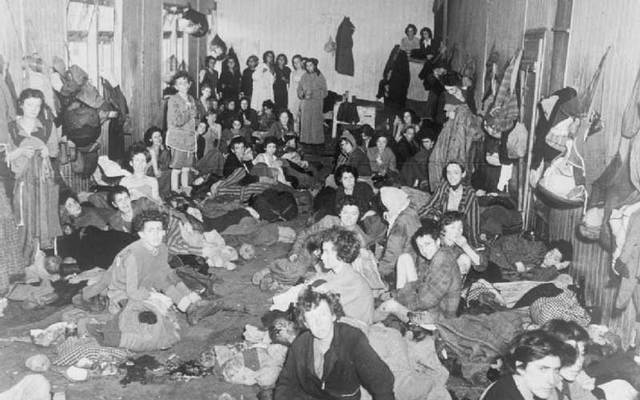Top Stories
Irish Priest Reflects on Bergen-Belsen Liberation 78 Years Later

UPDATE: Today marks the 78th anniversary of the liberation of the Bergen-Belsen concentration camp, a pivotal moment in World War II that exposed the horrific realities of the Holocaust. Father Michael Morrison, an Irish Jesuit priest serving as a chaplain with the British Army, was among the brave liberators who entered the camp on April 15, 1945, alongside British and Canadian troops.
The conditions inside Bergen-Belsen were unimaginable. The camp, designed for 10,000 people, held approximately 60,000 prisoners at the time of liberation. Troops discovered mass graves and survivors suffering from severe malnutrition, with the death toll at the camp reaching a staggering 50,000 between 1941 and 1945, including the renowned diarist Anne Frank, who perished just weeks before liberation.
Father Morrison, originally from Listowel, County Kerry, documented his harrowing experiences in diary entries that detail the devastation he witnessed. “What we saw within the first few days is utterly beyond description,” he recounted. He described people crawling on their hands and knees, too weak to walk, and the appalling conditions that led to deaths from enteritis and malnutrition.
In his first week, Morrison anointed nearly 300 dying people daily. The British Army was so overwhelmed by the number of deceased that they had to use a bulldozer to move bodies into mass graves. “The work has been physically the most revolting that I have been called on to do, but it has also been the most consoling,” Morrison reflected on the brutal reality of caring for the living and the dead.
As the camp’s conditions became known, Morrison decided to hold a Mass for the survivors. Despite heavy rain threatening to cancel the event, he was taken aback to find hundreds of people of various nationalities and religions waiting for the service. This Mass became a symbol of hope amid horror, showcasing the resilience of the human spirit.
The images and stories from Bergen-Belsen soon reached the world, revealing the atrocities committed by the Nazis and forever changing public perception of the Holocaust. In the months following liberation, the British torched the camp to prevent it from becoming a memorial site for the horrors witnessed there.
Historian Conor Dodd noted that the experiences at Bergen-Belsen profoundly affected Father Morrison for the rest of his life. After the war, he briefly served as a parish priest in Australia before returning to Ireland, where he passed away in 1973.
As the world reflects on this critical moment in history, it is a stark reminder of the importance of remembrance and education about the Holocaust. The legacy of Bergen-Belsen and the sacrifices of individuals like Father Michael Morrison continue to resonate today, urging us to confront the past and honor those who suffered.
For those interested in Irish history and the enduring impact of these events, discussions and shared stories can be found in dedicated groups on social media platforms.
-

 Top Stories2 months ago
Top Stories2 months agoTributes Surge for 9-Year-Old Leon Briody After Cancer Battle
-

 Entertainment3 months ago
Entertainment3 months agoAimee Osbourne Joins Family for Emotional Tribute to Ozzy
-

 Politics3 months ago
Politics3 months agoDanny Healy-Rae Considers Complaint After Altercation with Garda
-

 Top Stories3 months ago
Top Stories3 months agoIreland Enjoys Summer Heat as Hurricane Erin Approaches Atlantic
-

 World4 months ago
World4 months agoHawaii Commemorates 80 Years Since Hiroshima Bombing with Ceremony
-

 Top Stories2 months ago
Top Stories2 months agoNewcastle West Woman Patricia Foley Found Safe After Urgent Search
-

 Top Stories4 months ago
Top Stories4 months agoFianna Fáil TDs Urgently Consider Maire Geoghegan-Quinn for Presidency
-

 World4 months ago
World4 months agoGaza Aid Distribution Tragedy: 20 Killed Amid Ongoing Violence
-

 World4 months ago
World4 months agoCouple Convicted of Murdering Two-Year-Old Grandson in Wales
-

 Top Stories3 months ago
Top Stories3 months agoClimbing Errigal: A Must-Do Summer Adventure in Donegal
-

 World4 months ago
World4 months agoAristocrat Constance Marten and Partner Convicted of Infant Murder
-

 Top Stories3 months ago
Top Stories3 months agoHike Donegal’s Errigal Mountain NOW for Unforgettable Summer Views









